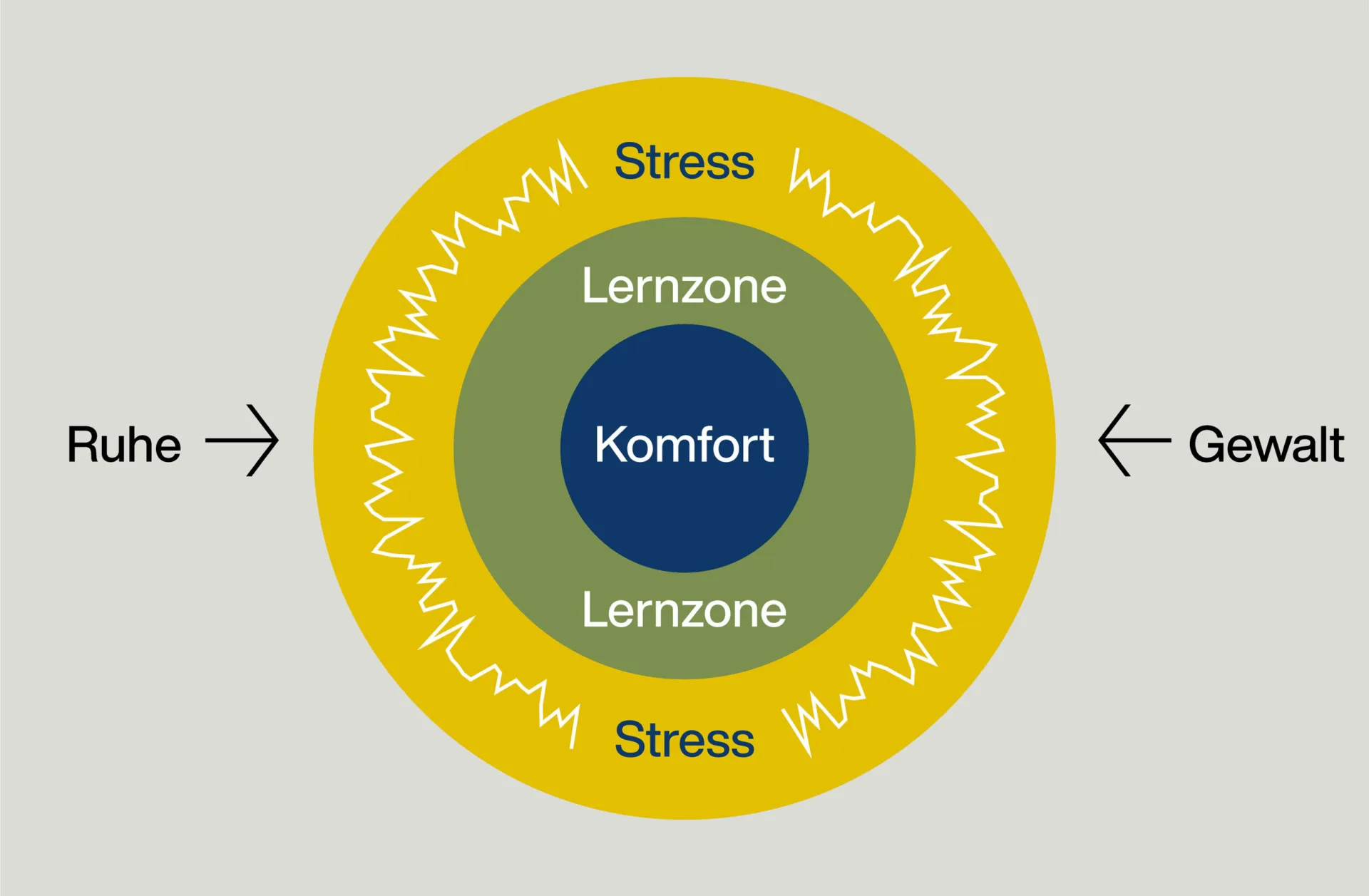As described in the section on "Homo Curiosus", we assume that there are no people in our organisation who are lazy, sluggish or passive. In addition, we‘ve known for years that a person that finds themselves outside of their comfort zone is, more likely than not, under some amount of stress. Perhaps not the kind of stress that makes you sick, but even mild stress doesn't make sense in the long term, either from a health or economic point of view.
A mind under stress is closed off
A person outside of their comfort zone is prepared by their body for fight or flight. Both are triggered by adrenaline, which separates the synapses in our brain. Chemical processes are initiated, increasing muscle tension and heart rate, allowing the individual to physically perform more. At the same time, blood is redirected from less critical parts of the body for fight or flight to the muscles.
The drawback of this process is that nearly all organs and sensors needed for our creative, innovative, or social abilities are put on "standby." The brain, in particular, is shifted into a kind of "energy-saving mode." Why would I need full brain capacity if I'm about to be eaten by a lion?
At work, we try to avoid both fight and flight because we have to sit still and shouldn't get angry. This can lead to freezing or paralysis. In this state of playing dead, almost all our systems are shut down, and we perceive very little.
Since one quickly learns that this can lead to job loss, many choose the fourth option: no identification, no emotion. They see work as a mere transaction of money for time, emphasizing not effectiveness or results. At this point, one feels definitively like an object. It feels like selling one's lifetime, resulting in demotivation and behaving like an object that always needs input to get moving.
How often have we heard: "Get out of your comfort zone now!" By this we very often mean, don't be so lazy or sluggish and finally step on the gas, dare to do something!
Sabine Bellefeuille-Burri, VRP BURRI public elements AG
Working with dopamine instead of adrenaline
The division of labour is mankind's greatest achievement. Only in this way is it possible that we do not have to focus solely on securing our existence like all other species. We must not forget: We don't work for money, but because not all of us want to build houses and farm.
Thousands of years ago, people decided that not everyone had to hunt, but that some people could focus on developing new tools or trading with other peoples. Money was only a means of transaction to exchange one form of labour for another.
Like every other being, the human was born to work. Through the division of labour, mankind experienced an enormous increase in productivity, so that the work of the individual created more than "just" a roof over his head and food in his belly.

Optimum interaction in the brain
Experiencing work as meaningful is possible when the person is predominantly in the so-called "comfort zone".Here, the thinking brainstem can work together in a optimal fashion with the brainstem, which is responsible for regulating automatic functions. The two work best when routine functions (such as accepting an assignment) are always the same in nature. This is because these are implemented in the brainstem, which processes more information more quickly, and with far fewer calories consumed. At such times, we are in a state that is approximate to sleeping wakefulness. Changing gears while driving is a good example of this.
The cerebrum, on the other hand, is always on the lookout for the new. And if it succeeds, it releases the so-called happiness hormone dopamine and gives us a sense of motivation – we enter the learning zone in a manner that is playful and self-motivated. It’s also where creativity and the conscious perception of communication are situated. This is important for making connections and for information to be understood quickly and synchronously. This process takes place in the cerebrum, which, of all the organs, consumes the most energy (with the exception of during sport).
The comfort zone / learning zone principle dictates that a person makes their greatest economic contribution when the working hours are spent mostly in their comfort zone, but when they also periodically switch (in a self-motivated manner) to the learning zone. Because it is only there that they have full access to all of their capabilities and talents.
Playful oscillation between comfort zone and learning zone
Ask yourself the following question: "How much time do I spend in my day-to-day work on tasks and responsibilities that I know I'm not suited to? How often do I playfully enter the learning zone?"
This playful and very productive oscillation between comfort zone and learning zone takes place where our talents and interests lie. This is where we ultimately become an authority in the respective area. In everything else, we can't keep up with those who feel comfortable there.
Our credo is: everyone at BURRI should spend at least ten per cent of their time in a learning zone that does not correspond to their strengths and is close to the stress zone. This broadens our horizons. When we do something that is not within our authority, we discover new things about ourselves and feel our (in)ability to perform. This strengthens our resilience and helps us to keep our egos in check. We develop and retain an understanding of why others don't succeed at what comes easily to us, and vice versa! At best, we even discover new talents in ourselves - in any case, it is a good exercise in learning to be grateful and appreciative of others in the same situation.
In our society based on the division of labour, it is crucial to bring as many people as possible into this dynamic of learning and comfort zone - because this is when the greatest prosperity is created for society.
In doing so, we should understand that every role is equally important and not build hierarchies in our heads. It is also clear that this will close the pay gap. This benefits not only those who were previously at the top of the hierarchy as "egg-laying wool-mill sows" and exposed to unrealisable expectations - in that they have less stress. Those who were previously only recipients of orders also benefit - in that they can also utilise their talents and gain creative power. In a harmonised state, this creates a swarm intelligence: we at BURRI are certain that this is the best way to master the challenges of the VUCA world.

Less stress and more creative freedom
We should understand that every role is equally important and that no hierarchies are built in our heads. It is also clear that this closes the pay gap.
It's not just those who were previously at the top of the hierarchy, exposed to unrealisable expectations, who benefit from this - because they have less stress. Those who were previously only recipients of orders also benefit - as they can now utilise their talents and gain creative power.
In a harmonised state, this creates a swarm intelligence: we at BURRI are certain that this is the best way to master the challenges of the VUCA world.
We are convinced that performing roles that you enjoy doing all day is not a sign of laziness or laziness, but the best way to achieve sustainable entrepreneurial success!